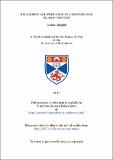Files in this item
Religiosity and prejudice in a Western and Islamic context
Item metadata
| dc.contributor.advisor | Mavor, Kenneth Ian | |
| dc.contributor.author | Albaghli, Bashar | |
| dc.coverage.spatial | 220 p. | en_US |
| dc.date.accessioned | 2018-07-23T10:01:48Z | |
| dc.date.available | 2018-07-23T10:01:48Z | |
| dc.date.issued | 2017 | |
| dc.identifier.uri | https://hdl.handle.net/10023/15634 | |
| dc.description.abstract | This thesis examines the relationship between religiosity and prejudice in both a Western and Islamic context. The first part of the thesis examines the relationship between Christian religiosity and anti-Islamic attitudes (attitudes towards Islam and Muslims). The Muslim groups included Muslims from the Arabian Gulf, Asia, Middle-East, and native-born Muslims living in the West. Religious measurements focused on Christians were explored with measures of Fundamentalism, Intrinsic/Extrinsic religious orientations and the Post-Critical Belief scale. Two Studies were conducted in the UK (Study 1; N=339 and Study 2; N=299) and the results revealed that fundamentalism predicted negative attitudes toward Islam and Muslims. Further, the Factor Analyses (FA) and Structural models (SEM) supported a single underlying dimension for anti-Islamic attitudes (outcome variables). Next, two additional studies were carried out in the US, with Study 3 (N=228) conducted immediately prior to the 2016 US presidential elections including similar measures of Islamophobia and multiple measures of religiosity. The same sample was followed up several months after the elections (Study 4; N=111). The results in the American context were in line with the previous studies in the UK. Following these studies in a Western context, the final study was conducted (in Arabic) in an Islamic context (Study 5; N=270). Most of the sample participants were from Kuwait, Saudi Arabia, Iraq, Egypt, and followed by other Arab countries. The sample also included Sunni, Shia, and ex-Muslims. Since there has been less research on these issues in the Islamic context, new measures were developed to look at general Muslim religiosity, Islamic Fundamentalism, attitudes toward Christians, Jewish, and toward the West. The new scales were analysed using factor analysis, and the overall data examined with SEM to explore models analogous to those explored in the UK and US contexts. The findings in this study reveal that Muslim religiosity and Islamic fundamentalism are significant predictors of prejudiced attitudes toward Christians, Jewish, and the West. The conclusion highlights the importance of these findings, specifically to clarify the role of religion on these particular prejudices that are so central to current world conflicts. Limitations and avenues for future research are also discussed. | en_US |
| dc.language.iso | en | en_US |
| dc.publisher | University of St Andrews | |
| dc.subject.lcc | BP172.A63 | |
| dc.subject.lcsh | Religiousness--History | en |
| dc.subject.lcsh | Christianity and other religions--Islam | en |
| dc.subject.lcsh | Islam--Relations--Christianity | en |
| dc.title | Religiosity and prejudice in a Western and Islamic context | en_US |
| dc.type | Thesis | en_US |
| dc.type.qualificationlevel | Doctoral | en_US |
| dc.type.qualificationname | PhD Doctor of Philosophy | en_US |
| dc.publisher.institution | The University of St Andrews | en_US |
This item appears in the following Collection(s)
Items in the St Andrews Research Repository are protected by copyright, with all rights reserved, unless otherwise indicated.

